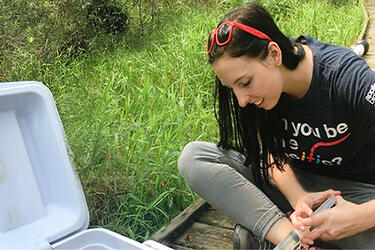ES PhD candidate Justyna Hampel feature
Leading Women in Marine Science
September 29, 2018

September 29, 2018
On August 17, 2018 Justyna Hampel, a PhD candidate in Environmental Science at Wright State University, was interviewed by Hannah Rudd, a scientist, ocean advocate and aspiring environmental journalist. Rudd is the author of a blog titled "Leading Women in Marine Science". We are pleased to be able to share her interview, which is reprinted here with permission.
Justynas' research focus is in aquatic biogeochemistry and nitrogen cycling in aquatic ecosystems affected by toxic algal blooms. Her field sites include Lake Taihu (China), Lake Erie and Lake Okeechobee (US) and Saint Lucie Estuary
Finding the right college means finding the right fit. See all that the College of Science and Math has to offer by visiting campus.